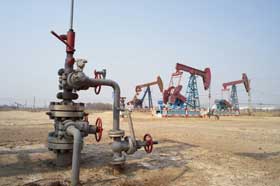OCTGs and the World of Oil Exploration
Everything that makes modern life possible including transportation, refrigeration, manufacturing, and even the device you are using to read this blog, could not function without a constant supply of gas and oil. In 2013, the world consumed a staggering 91 million barrels-a-day, with the United States leading the way with 18.5 million barrels used.
In order to provide consumers with oil, it takes trillions of dollars to discover, extract, transport, and process this precious commodity. On average, total upstream costs for producing, a single barrel of crude oil or natural gas in the U.S. is $31.38 on-shore and $51.60 offshore. In the 2nd Quarter of 2014 alone, industry-leaders Exxon Mobil, Chevron, BP, and Petrobras spent a massive $29.05 billion on upstream costs.
While there are hundreds of different costs in oil and gas exploration, it turns out that a great deal of this spending—nearly $40 billion annually by 2017—can be attributed to the purchase of Oil Country Tubular Goods, or OCTGs. These critical components include seamless pipes, tubes, and casings in use in the drilling and transportation of oil and gas.
In order to gain the trust of oil exploration companies, OCTGs must provide users with high levels of strength and corrosion resistance. Failing to do so not only damages the bottom line, but also lowers worker and environmental safety, which is a major concern for the entire industry.
To guarantee safety and cost-effectiveness, OCTGs are made from the strongest grades of steel, including those that contain carbon-manganese and molybdenum. These grades are highly resistant to hydrogen embrittlement and sulphide stress cracking, both of which are major causes of degradation in OCTGs.
As you might expect, it is critical to choose the right OCTG to match your specific needs. Since every oil exploration job is unique, OCTGs come in a variety of shapes, sizes, wall-thicknesses, and chemical compositions. It is extremely important to have an expert guide you through this difficult task.
At Continental Steel, we take pride in providing some of the biggest names in the oil industry with a wide variety of OCTGs including insulated conductor casings, sucker rods, drill pipes, and pipeline components. Our commitment to quality means that all of our OCTGs meet the highest industry standards including those demanded by the prestigious American Petroleum Institute (API).
In addition to our comprehensive selection of OCTGs, we also provide customers with an array of oil & gas industry chemicals. These chemicals, which are available through our sister company Continental Chemicals USA (CCUSA) do everything from protect your OCTGs from general corrosion to removing damaging rust.
In order to comply with almost any requirement and specification, OCTGs are available in a number of grades. Popular grades of OCTG include H40, J55, K55, and N80, each of which is compliant with API specification 5CT. They are available in a range of sizes, such as 2 3/8”, 3 ½”, 4”, and 4 ½”, and in casings weighing 4 lbs/ft to 39 lbs/ft to 106.5 lbs/ft.
Without high-quality OCTGs it would be impossible to produce the millions of barrels of oil demanded by the modern world. If you are in the market for a trusted and cost-effective supplier of the most advanced OCTGs available, or would simply like to learn more about the world of OCTGs, please feel free to contact the experts at Continental Steel today.







